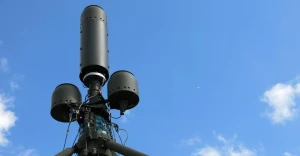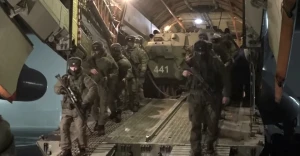
Peacekeeping mission in Ukraine: Macron’s fantasy or realistic truce plan?
With Donald Trump's victory in the U.S. elections, media discussions about a potential European-led peacekeeping mission in Ukraine have intensified. While several countries have expressed interest, with France taking the lead, such a scenario would first require a ceasefire
Contents
- From idea to reality: history of peacekeeping missions
- France in peacekeeping missions: why most French troops are in Africa
- Peacekeepers in Ukraine: decade-old idea
- Will French and international peacekeepers be deployed in Ukraine?
French President Emmanuel Macron plans to discuss the deployment of a peacekeeping mission to Ukraine at the December 18-19 summit of European Union leaders. This initiative involves the possible deployment of European peacekeepers if the fighting stops and peace is reached between Ukraine and Russia. President of Ukraine Volodymyr Zelenskyy is also planning to attend the summit to discuss such a scenario to obtain security guarantees in the event of a truce in the war with Russia, as the future U.S. president wants.
Espreso will explore the history of peacekeeping missions, why France is so interested and proactive, and whether we can expect the deployment of peacekeeping forces in Ukraine.
From idea to reality: history of peacekeeping missions
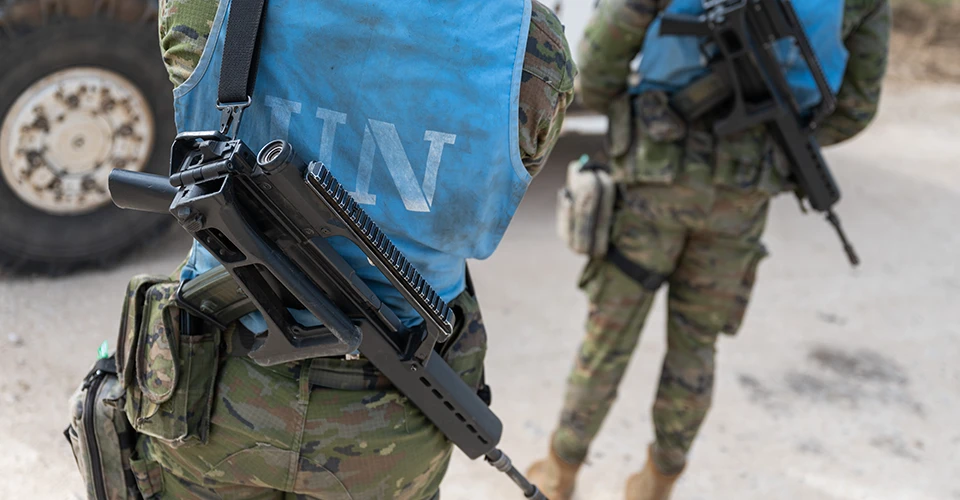
Wars between states also have a psychological foundation rooted in the conflict between two individuals living within a community. At the core of any conflict is a contradiction that escalates between the two parties. When this confrontation reaches large scales, a third party often enters the picture, primarily assuming a neutral stance to achieve a truce between the warring parties. The effectiveness of this third party depends on whether both conflict participants recognize its legitimacy and authority. Essentially, peacekeepers in international conflicts try to take the position of this third party, intervening between the warring sides to halt escalation and reach a peaceful understanding.
In modern times, the idea of collective intervention in conflicts emerged after World War I with the establishment of the first international organization aimed at fostering cooperation and security among nations—the League of Nations, the predecessor to the United Nations. In the 1920s and 1930s, the League of Nations attempted to prevent wars through diplomacy and sanctions. However, due to the lack of armed mechanisms, the organization was weak and largely ineffective. Nevertheless, the League’s supervision of the International Forces in the Saar (1934 - 1935) may be one of the earliest examples of international forces tasked with peace monitoring.
After World War II, with the establishment of the United Nations in 1945, the shortcomings of the League of Nations were addressed, laying the foundation for effective peacekeeping operations. The UN Security Council makes decisions about creating, composing, deploying, and funding UN peacekeeping forces, while the Military Staff Committee provides strategic leadership.
The first official UN peacekeeping mission, UNTSO (United Nations Truce Supervision Organization), was established in 1948 to monitor the truce between Israel and its Arab neighbors. This mission, conducted without armed intervention, laid the groundwork for subsequent UN-led peacekeeping operations. A similar mission followed in 1949 along the India-Pakistan border after the 1947 Indo-Pakistani War, overseeing the ceasefire. Classic examples also include international coalition actions in 1950–1953 to defend South Korea from North Korean aggression and in 1990–1991 to protect Kuwait from Iraqi aggression.
Overall, UN peacekeepers have participated in 72 missions worldwide, 12 of which are ongoing today. In 1988, the Peacekeeping Forces were awarded the Nobel Peace Prize.
In addition to the UN, NATO also conducts international peacekeeping missions. The Alliance began this aspect of its operations only after the collapse of the USSR. NATO's first such operation was its involvement in resolving conflicts in the former Yugoslavia, marking the start of a new era for the Alliance. Since then, NATO has conducted missions in Afghanistan, Iraq, Libya, and against Somali pirates, among others.
NATO missions differ from UN peacekeeping missions, as they often take a side in the conflict and aim to achieve security aligned with the interests of its members. One of the key differences lies in the approach - NATO does not always act as a neutral party, whereas the UN strives to maintain equidistance from all parties involved in the conflict.
France in peacekeeping missions: why most French troops are in Africa
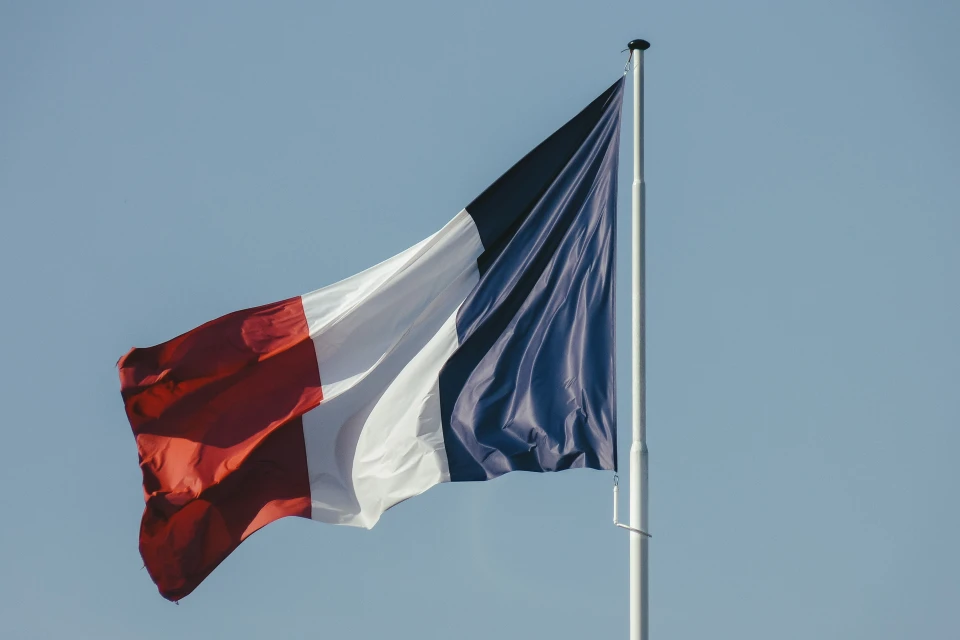
France has always been one of the most active countries in global peacekeeping operations, driven by its historical legacy, geopolitical interests, and ambition to assert its influence in global politics. As a permanent member of the UN Security Council, France plays a key role in shaping decisions on peacekeeping missions and provides substantial resources and military personnel to support their implementation.
France's peacekeeping interests have long been focused on Africa, reflecting its history as one of the largest colonial empires, with vast territories on the African continent. Many countries where France has participated, or continues to participate, in peacekeeping operations are its former colonies, such as Mali, Chad, and the Central African Republic.
"With the end of the colonial era, France continues to pursue a foreign policy aligned with its regional priorities, maintaining its presence, including military, in the region. In the 1960s, the French government signed secret agreements with several African states following their independence. These agreements focused on three main areas: trade, cooperation and finance; diplomats; and military forces. Franco-African agreements grant the French a dominant and privileged position in Francophone African countries," notes political scientist Nataliya Malynovska in her 2015 article, The role of France in UN peacekeeping missions and operations in the Arab-Muslim World.
From 1962 to 1995, France intervened militarily in African countries 19 times. In the mid-1990s, France deployed a 9,000-strong military contingent in Africa. However, its military presence did not always have a positive impact on conflict resolution. Notably, during the 1994 Rwandan genocide, French forces failed to prevent the killing of nearly one million people.
As of 2014 - 2015, France ranked third in contributions to UN peacekeeping operations, most of which were conducted in African and Middle Eastern countries.
In recent years, France has begun to reassess its cooperation policy with African countries. This shift has been influenced by military coups and changes in governments across Sahel nations. The new regimes express distrust toward France's presence and seek alternative partners (for example, the presence of former Wagner Group operatives in Mali). Additionally, many former French colonies have experienced a rise in nationalist and anti-colonial sentiments among their populations. Analysts suggest that the slogan "France, out!" has become a new way to legitimize political and military power in Francophone Africa.
With that in mind, in March 2023, French President Emmanuel Macron announced a plan to reduce France's military presence in Central African countries such as Senegal, Côte d'Ivoire, and Gabon by 70%. This decision was part of a strategy to decrease visible military presence and move towards more flexible forms of cooperation, as reported by Le Monde.
Over the past two years, France has begun withdrawing its forces from Mali, Burkina Faso, and Niger. In December 2024, France also began withdrawing its troops from Chad. The first military planes have already left the capital, N’Djamena. This move followed Chad's announcement of ending its defense cooperation with France. About 1,000 French soldiers remain in Chad, but the conditions of their continued presence have yet to be determined.
Currently, France is adjusting its strategy in Africa, taking into account the region's political changes and sentiments, aiming to maintain stability through partnership and cooperation rather than direct military presence. Accordingly, thousands of French peacekeepers who have returned and continue to return from Africa are the forces President Macron plans to utilize in Ukraine if a ceasefire is achieved and the deployment of foreign troops is permitted.
Peacekeepers in Ukraine: decade-old idea
The idea of deploying peacekeeping forces in Ukraine is not new. It has been discussed since the outset of Russia's aggression in 2014.
On February 18, 2015, the National Security and Defense Council of Ukraine supported an appeal to the UN and the EU regarding the deployment of an international peacekeeping operation on Ukrainian territory. In September 2017, Ukraine, the United States, France, and Germany prepared a joint resolution for the introduction of a peacekeeping mission. Even Putin seemed to be interested in this solution.
However, as Armyinform notes, there was no agreement on the key issue – where exactly these peacekeepers should operate. Russia wanted them only on the demarcation line, while Ukraine insisted that peacekeepers should operate across the entire territory of occupied Donbas, including the uncontrolled section of the border. Subsequently, the Kremlin began to change its rhetoric about the mandate of these peacekeepers – what they should do – and as a result, the idea faded away as Russia began preparing for a full-scale war.
When Russian soldiers openly crossed the Ukrainian border, the world seemingly abandoned the idea of peacekeepers. Moreover, the West unanimously began to argue that their soldiers would not be in Ukraine, as it could lead to a NATO war with Russia. Given that Russia possesses thousands of nuclear warheads, Western countries clearly drew this red line – providing weapons, money, and knowledge, but not soldiers.
However, the idea of capturing Kyiv within three days did not materialize for Russian invaders, leading them to gradually change their tactics as the war turned into a war of attrition. Both Ukraine and Russia have suffered significant losses, not only in human resources (with over a million soldiers reportedly affected), but also in economic damage. Hundreds of billions of dollars spent on the war create funding gaps in other sectors, which could ultimately lead to an economic collapse. While Russia has almost limitless reserves of gas and oil, allowing the Kremlin to tighten its belt and continue the war, Ukraine receives financial support from some of the wealthiest countries in the world.
As the conflict approaches its third year, not only does the question arise of who can outlast whom in this war of attrition, but there is also a growing question – is it not time to consider stopping to regroup, so to speak?
Will French and international peacekeepers be deployed in Ukraine?
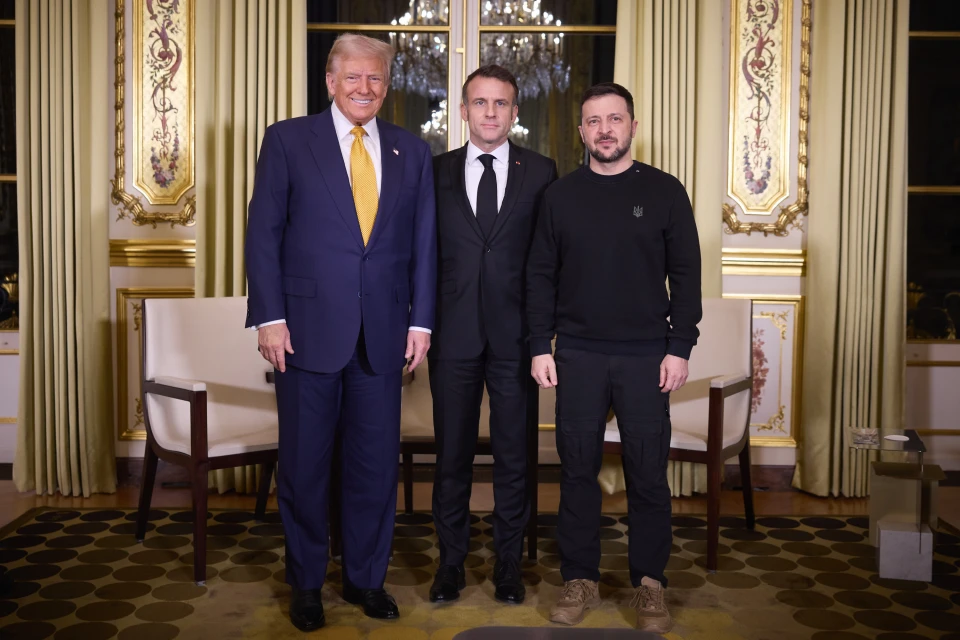
The idea of a ceasefire, negotiations, and diplomacy is actively championed by Donald Trump. His inevitable return to the White House on January 20th has already prompted Ukraine to adjust its rhetoric regarding the possibility of negotiations with Russia. However, for Kyiv, security guarantees are crucial, and peacekeepers are one option, although the priority remains joining NATO, a move that the Americans do not support.
As known, the United States is the largest donor to Ukraine, and without Washington’s support, Ukrainian forces cannot sustain their fight independently (unless other partners double or triple their efforts, which seems doubtful). During his pre-election campaign, Trump stated that Europe should play a more active role in addressing the conflict in Ukraine, implying that the U.S. cannot afford to continue providing substantial financial support to Ukrainians. Thus, Washington’s future policy is pushing European leaders to explore alternative options, as everyone understands that changes in this conflict are imminent from next year onwards. Therefore, European leaders are doing their "homework" – preparing new plans on how to continue supporting Ukraine.
Against this backdrop, the old idea of deploying peacekeepers in Ukraine has resurfaced in diplomatic circles. French President took up the initiative on this front, intriguing Europe with his statements in February-March of this year about not ruling out the possibility of sending Western troops to Ukraine. Macron was trying to introduce a new approach in relations with Russia – strategic ambiguity – to stay one step ahead of the Kremlin, which would not know what to expect from Ukraine’s allies. The French President also mentioned that the issue of sending Western troops to Ukraine would naturally arise if Russia breached the Ukrainian front lines and Ukraine made such a request. However, Ukraine has not made such a request.
Moreover, allies opposed such an initiative, and discussions subsided until the announcement of the U.S. election results. After that, according to Le Monde, discussions in Europe resumed regarding the deployment of troops or private military contractors to Ukraine, with talks reportedly initiated between the United Kingdom and France.
As reported by The Wall Street Journal, on December 7 in Paris, Donald Trump, during a meeting with the presidents of Ukraine and France, stated that if Moscow and Kyiv reach a ceasefire agreement, the truce should be monitored by European forces. Just days later, Macron traveled to Poland, and according to Rzeczpospolita, one of the main topics discussed was the deployment of French and Polish peacekeepers to Ukraine. The Poles even mentioned a specific number—five brigades, or 40,000 soldiers. However, Austrian military expert Gustav Gressel noted that such numbers were relevant before the full-scale war and are now insufficient.
Later, Italian Defense Minister Guido Crosetto announced that Italy was ready to send a peacekeeping contingent to Ukraine. Similarly, German Defense Minister Boris Pistorius stated that his country is prepared to contribute to ensuring a potential future peace agreement between Russia and Ukraine.
"If there is a ceasefire, then, of course, the Western community, NATO partners, potentially the United Nations, and the European Union will need to discuss how such peace and ceasefire can be ensured. And it is clear that Germany, as Europe's largest economy, would play a certain role in this," Reuters quotes Pistorius.
Some European leaders have expressed caution regarding this initiative. Polish Prime Minister Donald Tusk stated that Poland would not send peacekeeping troops to Ukraine following a ceasefire. Finnish President Alexander Stubb noted that any peacekeeping mission in Ukraine would require a clear UN mandate as well as substantial military resources. Dutch Foreign Minister Caspar Veldkamp believes it is too early to speculate about a potential peacekeeping mission in Ukraine.
A similar sentiment was echoed by the EU High Representative for Foreign Affairs and Security Policy, Kaja Kallas, who emphasized that it is premature to discuss a peacekeeping mission as peace must first be achieved.
"To deploy peacekeepers, there must first be peace, but it is very clear that Russia does not want peace," said Kaja Kallas.
Thus, there is currently no certainty about when, or even if, French or other international peacekeeping forces will be deployed in Ukraine. While discussions continue, the implementation of such a mission primarily depends on achieving peace between Ukraine and Russia, obtaining the appropriate mandate from international organizations, and agreeing on the details among the participating countries.
"Under standard rules, the conflicting parties must agree on the deployment of such a mission. The area of deployment and the duration of the peacekeepers' stay are also crucial. All of this and much more must be agreed upon before sending troops," notes Hanna Shelest, Director of the Security Studies Program.
But for now, the Kremlin's rhetoric demonstrates a clear lack of interest in establishing peace, instead issuing only ultimatums. However, the key card has yet to be played—Donald Trump. It appears that the new U.S. president has already influenced Ukraine toward considering negotiations, and he may have the leverage to pressure Putin's regime. For instance, Trump could destabilize oil and gas prices by ordering a significant increase in production capacity or propose other coercive measures, such as harsher sanctions or increased military aid to Ukraine. Of course, Trump could choose to do nothing, but that would diminish his political capital, as resolving the war in Ukraine is a top priority for his forthcoming foreign policy agenda.
- News








